
It’s summer 1984 – Richard Branson has just launched Virgin Airways, the Soviet Union have boycotted the Olympic games, the miner’s strike is still raging on, and Footloose is pretty much the only thing you can watch in the cinema.
Amidst it all, happening miles under the cultural radar, a songwriter of astronomical talent and middling success walks into a pokey studio in New York. He’s clutching a battered notebook which contains eighty verses of a song that he’s been writing and re-writing for multiple years. A song that has been driving him to utter madness, residing tormentedly in his mind. The metre is running in the recording studio, so the eighty verses are promptly whittled down to just four and the song is finally wrestled into existence.
A barely noticed existence, that is.
Those four chosen verses, the ones lucky enough to have escaped the confines of the notebook, continue to dwell in obscurity for a while yet. This seemingly cursed song is housed in an album that the record company have refused, claiming it to be of no real commercial value. Subsequently, it will enjoy a tiny release in Canada in December 1984, but nowhere else. It is, to sum up, profoundly ignored.
Now, let’s fast-forward exactly forty years.
That obscure, over-looked and under-estimated, little song has been covered by more than three-hundred artists, including Bob Dylan, Jeff Buckley, and Lou Reed. Its lyrics have been dissected and studied by the likes of Bono and Salman Rushdie. It’s a movie soundtrack favourite, a talent show staple, and a part of the furniture at weddings and funerals the world over. Books have been written about it, documentaries made about it. I don’t think it’s a major exaggeration to say that it’s in the cultural air we breathe.
A song that once had its maestro banging his head against the floor in frustration, now belongs to us all. Can you hazard a guess at which song this may be the origin story of? I can give you a hint, if you’d like? It goes like this, the fourth, the fifth, the minor falls and the major lifts…
You’ve got it.
This humble tale is the story of ‘the baffled king composing Hallelujah’.
Generation after generation finds itself notably and profoundly moved by this song. We treasure it, we value it, we let far too many people cover it (looking at you, Justin Timberlake).
So, I guess I’m wondering - why?
It’s one of those odd questions to which everyone, and no-one, has the answer. And it’s not that I don’t recognise the outright genius of Leonard Cohen and accredit the success to his mastery, I do. But, apparently, not even Cohen himself fully understood why this song has become such a phenomenon. Its success is an oddity, really. So, we have every right to ask ourselves - what’s the magic sauce that’s mixed into this song?
Cohen... makes a bee line for the deep stuff, the uncomfortable stuff, the stuff we keep hidden – and plants the word ‘hallelujah’ in there.
It opens with Cohen telling the biblical story of King David, who played the harp so beautifully it had a kind of mystical effect – it supernaturally calmed the spirit of the dangerously erratic Israelite king, Saul. David, who himself would go on to become the ruler of Israel, is the ‘baffled king’ about whom and to whom Cohen appears to sing. As Alan Bright notes,
‘He (Cohen) has placed us in a time of ancient legend, and peeled back the spiritual power of music and art to reveal the concrete components, reducing even literal musical royalty to the role of simple craftsman.’
The second verse mingles two further biblical stories together – that of (afore-mentioned) King David and Bathsheba, and Samson and Delilah. Both stories, both men, are brought to despair by abuses of power, moral failure, violence, and death. Their lives are truly toppled by their own brokenness and their own breaking-things-ness. To borrow a phrase from Francis Spufford, their stories act as a signpost for the ‘human propensity to f*** things up’.
These verses are so particular in their subject matter yet so universal in their resonance. Most people have a vague-at-best understanding of the biblical stories its lyrics are alluding to, but a precise-to-the-point-of-painful understanding of the way that old ‘human propensity’ can have its way.
And here is Leonard Cohen, using such despair and brokenness to house a sacred cry. Here’s Leonard Cohen, placing his finger on our vulnerability and telling us that it’s right there – right in the place of pain and shame – where we can engage with the divine. Here’s Leonard Cohen, telling us that if the God of the Bible exists, he can handle the very worst of us.
This song, whether we know it or not, steels past our defences. It makes a bee-line for the deep stuff, the uncomfortable stuff, the stuff we keep hidden – and it plants the word ‘hallelujah’ in there. It tells us that brokenness is inevitable, but it can be made holy. Isn’t that our deepest desire? To know that we’re not too far gone? To be told that we’ll fail, all the time, but never one time too many?
I think, if you were to put that message in any context less real and raw, we’d be suspicious of it. If this song was less gritty, it would have stayed ignored. But it’s just messy enough to have us trust it, Cohen just about honest enough for us to believe him when he tells us that he ‘didn’t come to fool’ us.
So, long may it continue. Long may it sneak past our emotional barricades and wreak havoc in our guarded hearts. Long may the four-minute-long weep-a-thon reign (just, not Justin Timberlake’s version, I beg).





